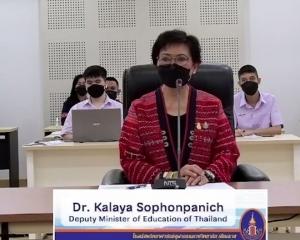The Ministry of Education has appointed a statutory manager to work with East Otago High School after a recent Education Review Office report revealed the school was slow to deal with issues raised in an earlier report.
Paul Spain, of Dunedin, has been appointed statutory manager and he met the school's board of trustees in Palmerston last night to begin work on ‘‘curriculum and personnel matters''.
An Education Review Office (ERO) evaluation carried out in 2004 identified the quality of education at the school was generally high, although learning in a small number of classrooms was not well managed.
A subsequent ERO evaluation completed last October found the quality of education at the school continued to vary widely.
‘‘ERO saw examples of effective teaching, especially in years 7 and 8 and in senior classes. In these classes, students were well engaged in their learning,'' the report said.
‘‘However, in some of the year 9 to 11 classes observed during the review, the teaching needs to improve.
‘‘In these classes, the behaviour of the students was disruptive and confrontational. Relationships within these rooms were negative and the learning of many students was disrupted as a result.''
During the review, a significant number of pupils expressed concerns about bullying. ‘‘The school's own survey of year 7 and 10 pupils raised major concerns about this as well, but very little has been done to improve the situation,'' the report said.
Although the school had some interventions in place, the report said there was little evidence of their success and the school's community was largely unaware of the seriousness of the issues that had been identified.
The review also found achievement information for pupils at the school was incomplete.
National qualification framework data showed the achievement of pupils in years 11 to 13 studying for National Certificates of Educational Achievement (NCEA) was similar to, or better than, that of pupils at other schools of the same type. But the achievement information available for pupils in years 7 to 10 was ‘‘less accurate''.
‘‘The board's plans and targets for student achievement are not specific and therefore of limited value in providing a basis for improving students' learning.''
The report advised that the teaching staff appraisal system needed to improve so teachers could receive support and all pupils could benefit from high quality teaching practices.
Senior managers were not analysing pupils' assessment information to identify the strengths and areas for improvement, the report said. As a consequence, self-review practices at the school were not providing useful information that helped managers and trustees with their strategic and annual planning.
Overall, the 2007 ERO report showed ‘‘little progress'' had been made by the senior managers of the school in addressing the concerns outlined since 2004.
Several other board and management matters needed attention. These concerns included the need to develop and make use of an annual plan; ensure all staff were correctly employed; develop plans and targets for Maori pupils; and follow the correct procedures and provide accurate reporting of standdowns to the Ministry of Education.
As a result of ERO's findings, the school's board of trustees requested support to assist it in improving curriculum management and personnel management. ERO recommended that the Secretary for Education consider intervention under Part 7A of the Education Act 1989 in order to bring about improvements.
The board's membership is made up of acting principal Joyce Whyman, chairman Gary Johnston, deputy chairman Peter Lobb, Iain Ford, Eion McKean, Gill Coughlan and staff representative Kirsty McLachlan.
It was hoped Mr Spain could help strengthen governance practices; improve professional leadership (including personnel management); improve teaching practices, pupils' attendance and their engagement in learning; and provide a safe, physical and emotional environment.
Mrs Whyman said the school and board of trustees had taken the latest ERO report very seriously and strides had been taken to address the issues raised.
Board of Trustees chairman Gary Johnston said the issues highlighted in the ERO report were not ‘‘unique'' by any means.
‘‘Most of the issues have been rectified already and the change to the atmosphere at the school is significantly more positive.''
Mrs Whyman said although she had been deputy principal at the school during the past four years, she could not comment on the reason for the school's slow response to issues raised in the 2004 ERO report.
The Education Review Office intends to return to the school within 12 months to evaluate the school's progress.











